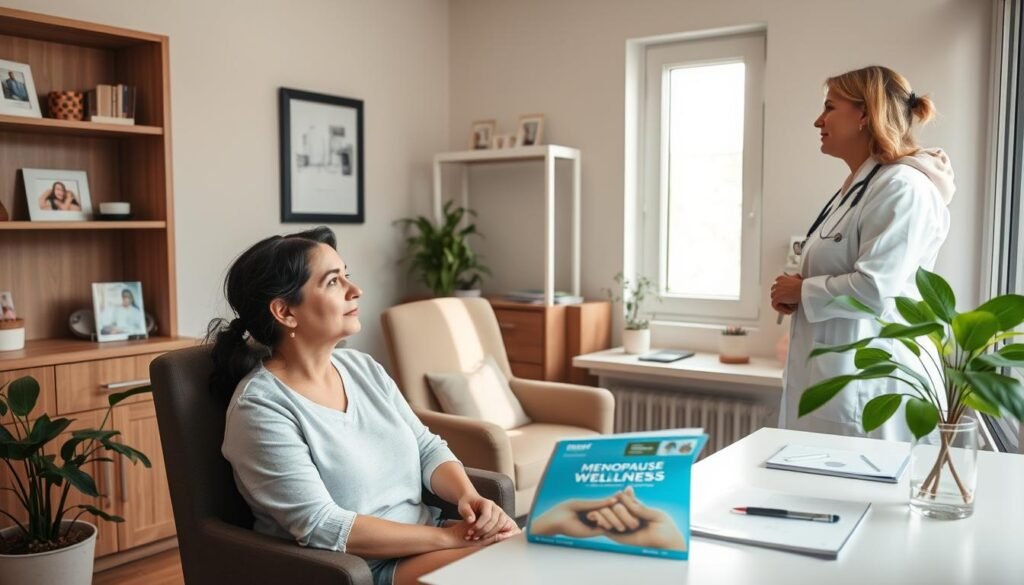Did you know up to 75% of women feel tired during menopause? This stage often starts in a woman’s 40s or 50s. It brings symptoms like hot flashes, mood swings, and deep exhaustion that doesn’t go away, even with rest. Menopausal fatigue can make daily life tough, leaving many feeling weak and unable to cope. Knowing about this energy loss is key to taking back control.
There is good news, though. Women can use certain methods to feel more energetic and fight off menopause tiredness. Eating well, staying active, and using relaxation techniques can all help. These steps boost energy and make life better during menopause. Let’s dive into these solutions and help women feel strong and happy during this important phase of life.
Key Takeaways
- Fatigue during menopause affects up to 75% of women.
- Common symptoms of menopause can disrupt sleep and exacerbate tiredness.
- Implementing lifestyle changes can significantly improve energy levels.
- Nutritional strategies, including soy-rich foods, may alleviate symptoms.
- Regular exercise plays a crucial role in enhancing sleep quality.
- Relaxation techniques help combat fatigue and promote renewal.
Understanding Menopause and Its Effects on Energy Levels
Menopause marks the end of a woman’s reproductive years, usually in her 40s or 50s. It leads to many changes, including how much energy a woman has. Due to hormone swings, many women feel very tired during menopause.
Women might face hot flashes, mood changes, and trouble sleeping during this time. These issues add to the tiredness caused by hormone changes. This makes overall energy levels drop. The mix of physical and emotional strains during menopause can lower motivation and life energy.
Many women struggle with these problems. A study found that 85.3% of women after menopause felt physically and mentally tired. But, only 19.7% of women before menopause felt that way. These numbers show how menopause can hugely affect energy levels. They underline the importance of understanding and supporting women during this time.
Lifestyle and health conditions affect menopause fatigue. Things like using alcohol or drugs, having anemia, heart disease, or feeling depressed or anxious can make fatigue worse. Knowing this helps women find the best way to handle these symptoms.
A good way to deal with menopause tiredness includes exercise. Yoga and Pilates can really help ease these symptoms. Research from 80 studies shows that yoga and aerobic exercise are good for fighting menopause-related tiredness.
By knowing the challenges and choosing a healthy lifestyle, women can lessen hormonal fatigue’s impact. This proactive approach is key.
Hormonal Changes During Menopause and Fatigue
Women entering menopause see big changes in hormones, affecting their energy. Lower levels of estrogen and progesterone lead to menopause fatigue. These changes make even simple tasks feel hard.
By 51, most women produce fewer hormones, entering perimenopause. This can last years, bringing constant tiredness. Sleep issues like sleep apnea can make fatigue worse.
It’s key to understand how hormonal changes affect sleep and energy. Many notice a link between less estrogen and bad sleep, causing more menopause fatigue. It’s important to ask for help. Doctors can offer treatments such as hormone therapy and suggest lifestyle changes.
| Hormone | Effect on Body | Impact on Fatigue |
|---|---|---|
| Estrogen | Regulates various bodily functions, including sleep | Decline can lead to increased fatigue and sleep disturbances |
| Progesterone | Aids in sleep regulation and mood stabilization | Decrease may contribute to insomnia and mood swings |
Understanding these changes helps women manage menopause better. Talking to healthcare providers is crucial. It helps get the right support and treatment, easing the transition.
What Is Fatigue Menopause?
Fatigue menopause is a big challenge for many women in transition. It brings constant exhaustion that rest doesn’t fix. This fatigue deeply affects emotional and psychological health, making menopausal malaise worse. A study shows that 67% of women over 40 feel tired during menopause.
Defining Exhaustion in Menopausal Women
This kind of menopause tiredness goes beyond just feeling tired. It’s a deep sense of being drained that interferes with everyday life. Women might find it hard to concentrate and remember things, affecting their work and relationships. Fatigue is closely tied to changes in hormones, like serotonin, affecting mood and energy.
The Impact of Sleep Disturbances
Sleep problems play a big role in fatigue menopause. Night sweats and hormonal shifts disturb sound sleep. Almost half of perimenopausal women struggle with sleep. These issues make feeling tired worse and harm overall health. Eating well and exercising can help keep energy up.
The three Ps—pacing, planning, and prioritizing—are key for handling menopausal tiredness. To understand more about this symptom, check this source.
Recognizing Symptoms of Menopausal Fatigue
Understanding menopausal fatigue symptoms is key to managing and improving life quality. Women may face fatigue symptoms that affect their daily life and health during menopause.
Common Signs of Energy Loss
Many report low energy and tiredness during menopause. Signs include increased fatigue, concentration difficulties, irritability, and physical exhaustion.
- Increased fatigue
- Difficulties concentrating
- Irritability and mood swings
- Physical exhaustion
Menopausal weariness worsens with symptoms like hot flashes and sleep issues. These symptoms can vary, affecting women differently.
The Role of Emotional Well-being
Emotional well-being greatly affects menopause fatigue. Anxiety and low mood can make exhaustion worse. Understanding this link is essential.
Monitoring emotional health helps manage menopause fatigue. It’s a vital step.
To manage menopausal fatigue, consider lifestyle and dietary changes. Explore lifestyle adjustments at this resource for tips on improving energy and emotional health.
Effective Lifestyle Changes to Alleviate Fatigue
Making smart lifestyle changes can really help with fatigue during menopause. Eating well and staying active boosts energy and health. Many women feel tired during menopause, but healthy choices can fight this.
Importance of Nutrition in Managing Energy
What you eat is key in managing energy during menopause. Eating fruits, veggies, lean proteins, and whole grains helps fight fatigue. This mix of foods gives steady energy and helps avoid menopause weight gain. Foods like soy, which have phytoestrogens, might ease hot flashes and night sweats.
- Choose natural foods for better bone health.
- Staying hydrated helps with energy levels.
- Eating regularly keeps energy up and crashes at bay.
Benefits of Regular Exercise
Exercise helps beat menopause tiredness. Strength training twice a week keeps muscles strong and metabolism up. It also cuts heart disease risk and improves sleep, which reduces fatigue.
| Type of Exercise | Benefits |
|---|---|
| Strength Training | Keeps muscles strong and prevents bone loss |
| Cardio | Boosts heart health and energy levels |
| Flexibility | Makes moving easier and lowers injury risk |
By making these smart changes with diet and exercise, women can boost their energy. They can handle menopause better.
Diet Strategies: Foods That Boost Energy
Changing what you eat is key to fight fatigue during menopause. Adding certain foods brings the right nutrients for more energy. Foods rich in soy are great for this. They act like estrogen, helping ease menopause symptoms. Drink plenty of water too. Not having enough can make you tired and less sharp.
Incorporating Soy-Rich Foods
Eating soy-rich foods, like tofu, edamame, and soy milk, helps during menopause. They have isoflavones, a type of phytoestrogen. This helps balance hormones. One study showed that women eating more soy had fewer hot flashes. By eating these foods often, you can improve your hormones and energy.
The Importance of Hydration
Drinking enough water is crucial for your energy when going through menopause. Your body needs a lot of fluids to work well. Not drinking enough leads to being tired and not able to focus well. Aim for at least eight glasses of water a day. Eating water-rich fruits and veggies, like cucumbers, oranges, and strawberries, also helps. This boosts your energy and overall health.

| Dietary Element | Benefits |
|---|---|
| Soy-rich Foods | Help balance hormones, alleviate symptoms. |
| Hydration | Reduces fatigue, enhances concentration. |
| Fruits & Vegetables | Provides vitamins, minerals, and hydration. |
| Whole Grains | Supports energy levels, reduces fatigue. |
| Lean Proteins | Aids in muscle maintenance, boosts energy. |
Sleep Hygiene: Tips for Better Rest
Good sleep hygiene is key to fighting menopause tiredness. Using right strategies greatly improves sleep. A thoughtful setup of the sleeping area and certain techniques are helpful. They can make a big difference in dealing with menopause sleep issues.
Creating a Sleep-Friendly Environment
Creating the right sleep space is key for better sleep. A bedroom that’s cool, dark, and quiet aids in resting well. When setting up a sleep-friendly room, consider these:
- Temperature: Keep bedroom temperature between 66 to 68 degrees to ease hot flashes and night sweats.
- Lighting: Blackout curtains cut external lights, making the room darker.
- Quiet: White noise machines or earplugs can block out noise.
- Bedding: Choose breathable cotton and comfy bedding.
Techniques to Enhance Sleep Quality
Adding certain techniques can help improve your sleep. Here are strategies to try:
- Consistent Schedule: Sleep and wake at the same times daily.
- Bedtime Routine: Try calming activities like reading or warm baths before bed.
- Avoid Electronics: Cut screen time before bed, as blue light affects melatonin.
- Exercise: Walking or yoga can reduce insomnia symptoms.
- Caffeine and Alcohol: Avoid caffeine before bedtime and limit alcohol, both can impact sleep.
These steps help with better sleep hygiene and fight menopause fatigue. Women with ongoing sleep problems may find cognitive behavioral therapy for insomnia helpful. It tackles the root causes of sleep troubles effectively.
Relaxation Techniques to Combat Menopause Exhaustion
Effective relaxation techniques are key to fighting menopause exhaustion. They not only relieve stress but also improve overall health. By using meditation and mindfulness, women can lessen fatigue and increase energy.
Meditation and Mindfulness Practices
Meditation is great for relaxing during menopause. Deep breathing and visual imagery help focus the mind and calm emotions. These practices ease anxiety, insomnia, and mood swings. Mindfulness keeps you in the moment, easing stress from hormonal changes. Doing these daily improves sleep and emotional health.
Finding Time for Yourself
In a busy life, finding personal time is crucial for relaxation and renewal. Creating a routine for self-care can enhance your mood during menopause. Enjoying a book, a warm bath, or hobbies can boost your energy. Even a few minutes of relaxation each day reduces stress. For more tips on relaxation, check out WebMD’s guide on relaxation practices.

| Technique | Description | Benefits |
|---|---|---|
| Deep Breathing | Focus on taking slow, deep breaths to relax the mind. | Reduces stress and anxiety levels. |
| Visual Imagery | Visualize tranquil scenes or happy memories to foster relaxation. | Enhances mood and reduces fatigue. |
| Progressive Muscle Relaxation | Systematically tense and relax different muscle groups. | Relieves physical tension and improves sleep quality. |
| Mindfulness Meditation | Stay present and fully engage with the current moment. | Promotes emotional well-being and reduces hot flashes. |
| Relaxation to Music | Listen to soothing music to create a calming atmosphere. | Enhances relaxation and mood stabilization. |
Medical Treatments for Fatigue During Menopause
When dealing with menopause, many women face fatigue. They look for treatments to feel better. Hormone replacement therapy (HRT) is a key treatment. It helps ease symptoms and improve energy levels.
Evaluating Hormone Replacement Therapy
HRT can really make a difference. It tackles hot flushes, mood swings, and joint pains. These improvements can happen within weeks. However, mood changes might take longer to get better.
HRT also lowers the risk of certain health issues, like osteoporosis and heart disease. But, it’s important to talk about its risks with a doctor. This helps in making the right choice for your health.
Alternative Therapies: Acupuncture and Herbal Remedies
There are other ways to fight fatigue during menopause. Acupuncture is becoming a favorite for many. It helps improve how you feel overall. Herbs like black cohosh and red clover are being tried by some women too. Yet, these don’t have as much science support as HRT.
So, talking with a healthcare expert before trying them is wise. If you’re curious about more options, check out this piece on alternative therapies. It has lots of information.
| Treatment Type | Benefits | Considerations |
|---|---|---|
| Hormone Replacement Therapy | Relief from hot flushes, mood swings, and risk reduction for osteoporosis | Potential risks to discuss with a healthcare provider |
| Acupuncture | Improves overall well-being, reduces fatigue | May require multiple sessions for optimal effects |
| Herbal Remedies | Potential relief from symptoms | Lack of strong evidence regarding effectiveness |
What to Discuss with Your Doctor
When you feel tired from menopause, talking to a healthcare provider is key. You should be open about the fatigue you’re going through. This helps figure out if there are any health issues causing your tiredness.
Identifying Underlying Medical Issues
Several health problems can make you feel more tired during menopause. Issues like thyroid disorders or depression can seem like menopause symptoms. So, it’s important to tell your doctor about any signs that might suggest these problems. Common tests include:
- Blood tests for Follicle-stimulating hormone (FSH) and estrogen levels
- Thyroid-stimulating hormone (TSH) tests to rule out hyperthyroidism
- Home FSH tests, which offer insights into menopausal status
Finding out these health issues can help you get the right treatment. This can improve your life quality.
Medication Options Available
A doctor may suggest different medicines based on what you need. Hormone therapy is common for symptoms like hot flashes and bone loss. Other options include:
| Medication Type | Purpose |
|---|---|
| Antidepressants | Help with mood changes linked to menopause |
| Gabapentin | Reduce hot flashes |
| Clonidine | Help with hot flashes and sleep issues |
| Ospemifene | Help with vaginal dryness and discomfort during sex |
It’s crucial to talk openly with your doctor about any concerns or preferences with medications. This helps find the best treatment for you.

Community Support and Resources
Going through menopause can be tough. But, having support from a community can really help. Women often join support groups to talk about their experiences and how to deal with tiredness and other symptoms. These groups help people feel less alone while going through big changes.
Finding Support Groups for Menopause
Support groups let women meet others who understand what they’re going through. You can find these groups through local community resources, either meeting up in person or online. These meetings are a chance to learn helpful tips and advice. To find a group, you can ask health care providers or look for organizations focusing on women’s health. Online groups also make it easy to connect with people far away.
Accessing Educational Materials
Learning about menopause helps women manage symptoms better, like feeling very tired. The Menopause Society has guides for menopause education. These cover hormonal changes, common symptoms, and how to take care of yourself. By reading these materials, women can feel more in control and ready to face menopause with confidence.
| Resource Type | Example | Details |
|---|---|---|
| Support Groups | Local Community Health Centers | Provide in-person and online sessions for sharing experiences and support. |
| Online Forums | My Menopause Support | A platform for women to discuss menopause openly with others. |
| Educational Guides | The Menopause Society | Offers resources on managing symptoms and lifestyle adjustments. |
| Webinars | Society for Women’s Health Research | Interactive sessions focusing on menopause transition and health disparities. |
Conclusion
Dealing with fatigue is key to feeling better during menopause. Research shows that almost 68% of women in menopause feel very tired. Making good lifestyle choices, eating well, and getting medical help can really boost your energy. This proactive attitude helps women feel lively again and enjoy life more.
Many women fight with symptoms but don’t know how to handle them. It’s crucial that both patients and doctors know about ways to help. Strategies like exercising, drinking enough water, reducing stress, and eating healthy are effective. They significantly help lessen menopause fatigue.
During menopause, no woman should go through it feeling alone. Getting help from community, learning more, and following doctors’ advice can make a big difference. Taking care of your overall health and following personalized medical tips are very important. They help in overcoming fatigue and leading a happier life.